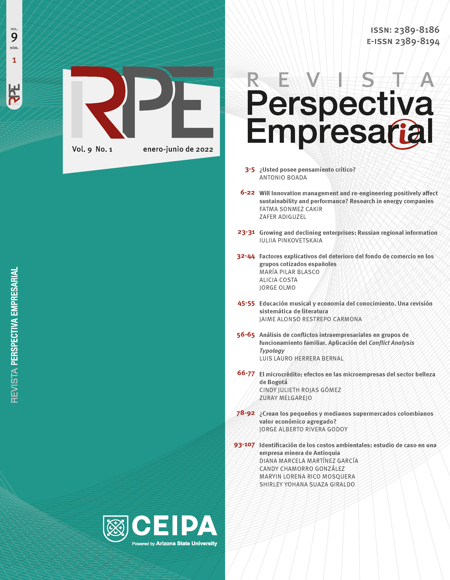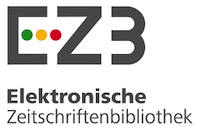Factores explicativos del deterioro del fondo de comercio en los grupos cotizados españoles
Factors explaining the impairment of goodwill in Spanish listed groups
##plugins.themes.bootstrap3.article.main##
Objetivo. Analizar qué factores pueden influir en la decisión de reconocer o no pérdidas por deterioro del fondo de comercio cuando se detecte que su valor neto contable excede de su importe recuperable. Metodología. Se aplicó un modelo de regresión logística multivariable sobre una muestra de sociedades cotizadas, todas ellas dominantes de grupos de empresas que presentaban cuentas consolidadas en España durante el período 2014- 2018. Resultados. Las pérdidas obtenidas por la entidad, deterioros contabilizados en ejercicios anteriores, al igual que el tamaño, son aspectos que influyen de forma positiva en el reconocimiento de deterioro de valor del fondo de comercio. Conclusiones. Este trabajo detecta cierto comportamiento discrecional por parte de los directivos derivado de la complejidad que conlleva la realización de la prueba de deterioro de valor del fondo de comercio, además de su falta de precisión.
Descargas
##plugins.themes.bootstrap3.article.details##
Abughazaleh, N.M., Al-Hares, O. and Roberts, C. (2011). Accounting discretion in goodwill impairments: UK evidence. Journal of International Financial Management and Accounting, 22(3), 165-204. DOI: https://doi.org/10.1111/j.1467-646X.2011.01049.x
https://doi.org/10.1111/j.1467-646X.2011.01049.x DOI: https://doi.org/10.1111/j.1467-646X.2011.01049.x
Avallone, F. and Quagli, A. (2015). Insight into the variables used to manage the goodwill impairment test under IAS 36. Advances in Accounting, 31(1), 107-114. https://doi.org/10.1016/j.adiac.2015.03.011 DOI: https://doi.org/10.1016/j.adiac.2015.03.011
Beatty, A. and Weber, J. (2006). Accounting discretion in fair value estimates: An examination of SFAS 142 goodwill impairments. Journal of Accounting Research, 44(2), 257-288. https://doi.org/10.1111/j.1475-679X.2006.00200.x DOI: https://doi.org/10.1111/j.1475-679X.2006.00200.x
Blasco, P., Costa, A. y Montes, A. (2019). Deterioro del fondo de comercio en las normas internaciones: un estudio de una muestra de grupos cotizados. Revista Perspectiva Empresarial, 6(2), 36-58. https://doi.org/10.16967/23898186.599 DOI: https://doi.org/10.16967/23898186.599
Cañibano, L. y Herranz, F. (2021). El controvertido tratamiento contable del fondo de comercio. Revista Consejeros, 167, 26-29.
Cavero, J.A., Amorós, A. and Collazo, A. (2021). Economic effects of goodwill accounting practices: systematic amortisation versus impairment test. Revista Española de Financiación y Contabilidad, 50(2), 224-245. DOI: https://doi.org/10.1080/02102412.2020.1778376
https://doi.org/10.1080/02102412.2020.1778376 DOI: https://doi.org/10.1080/02102412.2020.1778376
Chalmers, K.G., Godfrey, J.M. and Webster, J.C. (2011). Does a Goodwill Impairment Regime Better Reflect the Underlying Economic Attributes of Goodwill? Accounting and Finance, 51(3), 634-660. DOI: https://doi.org/10.1111/j.1467-629X.2010.00364.x
https://doi.org/10.1111/j.1467-629X.2010.00364.x DOI: https://doi.org/10.1111/j.1467-629X.2010.00364.x
Filip, A., Jeanjean, T. and Paugam, L. (2015). Using Real Activities to Avoid Goodwill Impairment Losses: Evidence and Effect on Future Performance. Journal of Business Finance & Accounting, 42(3), 515-554. DOI: https://doi.org/10.1111/jbfa.12107
https://doi.org/10.1111/jbfa.12107 DOI: https://doi.org/10.1111/jbfa.12107
Giner, B. and Pardo, F. (2015). How Ethical are Managers' Goodwill Impairment Decisions in Spanish-Listed Firms? Journal of Business Ethics, 132(1), 21-40. https://doi.org/10.1007/s10551-014-2303-8 DOI: https://doi.org/10.1007/s10551-014-2303-8
Glaum, M., Landsman, W. and Wyrva, S. (2015). Determinants of goodwill impairment incidence and intensity: International evidence. Recuperado de https://papers.ssrn.com/sol3/papers.cfm?abstract_id=2608425. DOI: https://doi.org/10.2139/ssrn.2608425
https://doi.org/10.2139/ssrn.2608425 DOI: https://doi.org/10.2139/ssrn.2608425
Hamberg, M., Paananen, M. and Novak, J. (2011). The adoption of IFRS 3: The effects of managerial discretion and stock market reactions. European Accounting Review, 20(2), 263-288. DOI: https://doi.org/10.1080/09638181003687877
https://doi.org/10.1080/09638181003687877 DOI: https://doi.org/10.1080/09638181003687877
Hayn, C. and Hughes, P.J. (2006). Leading Indicators of Goodwill Impairment. Journal of Accounting, Auditing & Finance, 21(3), 223-265. https://doi.org/10.1177/0148558X0602100303 DOI: https://doi.org/10.1177/0148558X0602100303
Jahmani, Y., Dowling, W. and Torres, P.D. (2010). Goodwill Impairment: A New Window for Earnings Management? Journal of Business and Economics Research, 8(2), 19-24. https://doi.org/10.19030/jber.v8i2.669 DOI: https://doi.org/10.19030/jber.v8i2.669
Lapointe-Antunes, P., Cormier, D. and Magnan, M. (2008). Equity Recognition of Mandatory Accounting Chances: The Case of Transitional Goodwill Impairment Loss. Canadian Journal of Administrative Sciences, 25(1), 37-54. DOI: https://doi.org/10.1002/cjas.41
https://doi.org/10.1002/cjas.41 DOI: https://doi.org/10.1002/cjas.41
Li, K., and Sloan, R. (2017). Has goodwill accounting gone bad? Review of Accounting Studies, 22(2), 964-1003. DOI: https://doi.org/10.1007/s11142-017-9401-7
https://doi.org/10.1007/s11142-017-9401-7 DOI: https://doi.org/10.1007/s11142-017-9401-7
Mazzi, F., Liberatore, G. and Tsalavoutas, I. (2016). Insights on CFOs' Perceptions about Impairment Testing Under IAS 36. Journal Accounting in Europe, 13(3), 353-79. https://doi.org/10.1080/17449480.2016.1244341 DOI: https://doi.org/10.1080/17449480.2016.1244341
Petersen, C. and Plenborg, T. (2010). How Do Firms Implement Impairment Test of Goodwill? Abacus, 46(4), 419-446. DOI: https://doi.org/10.1111/j.1467-6281.2010.00326.x
https://doi.org/10.1111/j.1467-6281.2010.00326.x DOI: https://doi.org/10.1111/j.1467-6281.2010.00326.x
Ramanna, K. and Watts, R.L. (2012). Evidence on the use of unverifiable estimates in required goodwill impairment. Review of Accounting Studies, 17(4), 749-780. https://doi.org/10.1007/s11142-012-9188-5 DOI: https://doi.org/10.1007/s11142-012-9188-5
Riedl, E. (2004). An examination of long-lived asset impairments. The Accounting Review, 79(3), 823-852. DOI: https://doi.org/10.2308/accr.2004.79.3.823
https://doi.org/10.2308/accr.2004.79.3.823 DOI: https://doi.org/10.2308/accr.2004.79.3.823
Sevin, S. and Schroeder, R. (2005). Earnings management: Evidence from SFAS No. 142 reporting. Managerial Auditing Journal, 20(1), 47-54. https://doi.org/10.1108/02686900510570696 DOI: https://doi.org/10.1108/02686900510570696
Siggelkow, L. and Zülch, H. (2013). What Drives Companies? An Analysis of Fixed Asset Write-offs in Europe in the Context of Different Institutional Settings. Recuperado de https://papers.ssrn.com/sol3/papers.cfm?abstract_id=2198809. https://doi.org/10.2139/ssrn.2198809 DOI: https://doi.org/10.2139/ssrn.2198809
Valero, J.I. (2017). Análisis de la discrecionalidad en el reconocimiento del deterioro del fondo de comercio: un estudio empírico. Madrid, España: Instituto de Contabilidad y Auditoría de Cuentas.
Verriest, A. and Gaeremynck, A. (2009). What determines goodwill impairment? Review of Business and Economics, 54(2), 1-23.
Wilson, G.P. (1996). Discussion Write-offs: Manipulation of Impairment? Journal of Accounting Research, 34, 171-177. DOI: https://doi.org/10.2307/2491432
https://doi.org/10.2307/2491432 DOI: https://doi.org/10.2307/2491432
Wines, G., Dagwell, R. and Windsor, C. (2007). Implications of the IFRS goodwill accounting treatment. Managerial Auditing Journal, 22(9), 862-880 https://doi.org/10.1108/02686900710829381 DOI: https://doi.org/10.1108/02686900710829381



































